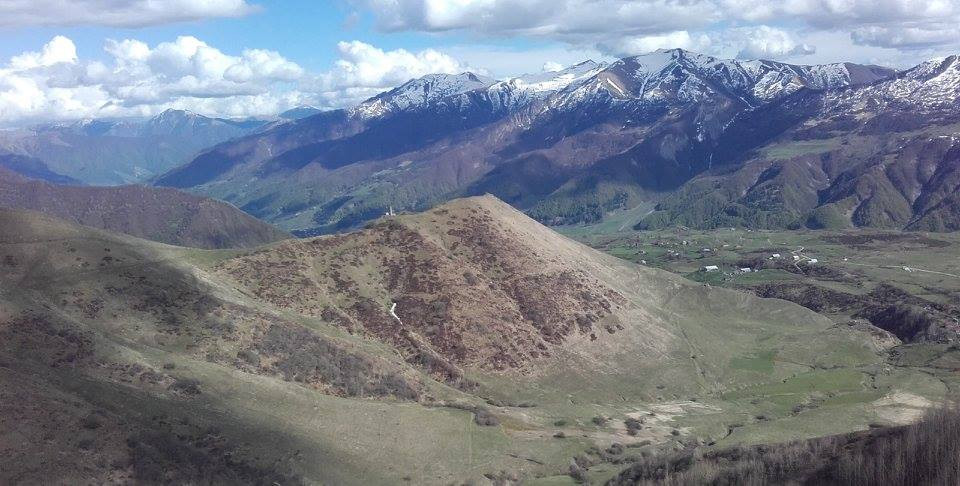The Rehabilitation of the Courageous Ones
Published: Jul 17, 2017 Reading time: 5 minutes Share: Share an articleHow does it look like on a psycho-social rehabilitation course for people, who live in countries with authoritarian or repressive regimes and who seek to defend human rights? Our co-worker Kateřina Zezulková describes her personal experience from one such course organized by People in Need, which took place in Georgia.

There is snow on the ridges of the Georgian three thousanders. Primroses grow in the valley and the black-and-white Araqvi River is full of fresh water. I get off the train on the second last stop before the terminal, carrying an awkward suitcase. Who has ever done this, bringing a suitcase like this to the mountains?! But this time, I am not here for a long mountain hike. I am here for work. Under People in Need, I will run a psychosocial rehabilitation program here. It aims at those who try to revive justice and plain common sense in their respective countries - countries with repressive regimes which restrict freedoms of their citizens. It aims at those who publicly criticize corruption, write for independent newspapers, defend those who were sentenced unjustly. For these deeds, the authorities chase them, they threaten and beat them, they imprison them and torture them.
In a cozy mountain guesthouse, a group of thirteen people sit around a table. The task is to present yourself in a way that is unrelated to your profession. Some of those present find it challenging; for most of them, fighting for human rights represents much more than just work. It is their lifestyle, their ethical duty, their only meaning of life. When they do it, they go all in. There are no small, risk-averse bets in this game. For missing clear internal boundaries, they face health and psychological problems, which can have fatal consequences.
It is Marina´s turn and she goes straight to her beloved topic: goats. The group grows silent and listens intently, and I find out about the uniqueness of the Czech breed. I miss the part where she explains what makes it so special, and instead I focus on how ardently she talks about her hobby. In my mind I wish that her enthusiasm is infectious enough to reach the rest of those whose lives may seem empty. After all, I have a feeling that there is something “healthy” that remained in these heroes, beyond their sad and tired eyes.
The group form of psychosocial rehabilitation is part of a wider program that we provide. Its goal is to prevent occupational burnout and to emphasize the need for mental health care among journalists, lawyers, civil society activists and others with similar professions from countries with authoritative political regimes.
The morning starts with a few exercises on a sleeping pad. It is an alternative to handfuls of painkillers against chronic pains that the participants often suffer from - the majority already built up immunity against those pills anyway. Sára, the therapist, explains the importance of correct breathing, in particular the relevance of a conscious and deep breathing out. Aggression can be alleviated by a special exercise called the “mule kick” - Sára puts her left leg forward, transferring her weight on it, eventually leaning forward. Then she bends the right leg, moves her arms as if picking up a haystack and accompanied by a loud, almost inexplicable sound, she strongly kicks with her right leg behind her. She repeats this move several times, as the initial embarrassment of the participants disappears. After a little while, the whole group “kicks and brays” at a brisk pace.
After nearly two hours, we are done with the exercises. The participants breathe loudly now, without signs of shyness. Finally, each of them names an emotion which they are feeling at the time, and, whatever this emotion is, they nod to symbolise that they internally acknowledge it.
Individual consultations follow after lunch. Many do not want to talk at first; they are not used to discussing their troubles even with their loved ones, let alone with a psychotherapist. But these things have to have an outlet, otherwise the headaches will not stop. I encourage them and I assure them that the discussion will only go as far as they allow it.
After dinner, the participants make themselves comfortable on sofas, put away their mobile phones and regain their focus. They were happy to accept the offer from the psychotherapists to teach them a method of team problem solving through a so called Balint group. In it, one person shares a complicated case with the group and he/she has a chance to gain new perspectives from the impartial participants. It is invaluable to realise that there are people around you who listen to you, understand and support you and give advice on how they would solve the problem in your place. The experience of sharing complicated problems with others then represents one of the new things that the participants are taking home with them.
Today's program is over. With Sára and Tomáš, we undergo a brief reflection of the day and prepare a plan for tomorrow. We want to believe that part of the weight that these courageous people carry was lifted and that they will therefore be able to sleep easier than during the last few difficult months at their homes.



